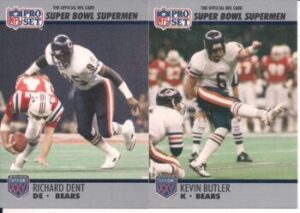Much has been said and written about the 1985 Chicago Bears, but what about the 1986 Bears? Many believe the 1986 Bears’ defense was even better than the 1985 team, despite defensive coordinator Buddy Ryan leaving to become the Head Coach of the Eagles.
The season started with a win against the Browns, but it didn’t come easily, as quarterback Bernie Kosar torched the Bears’ defense for 289 yards on 23 completions. The Browns’ offensive line did a great job, allowing only one sack. Walter Payton rushed for over 100 yards, and the Bears left Soldier Field with a hard-fought 41–31 victory.
Week two was no easier. The Bears’ defense looked more like the 1985 version, allowing just 10 points, but the Eagles’ defense played equally well, allowing backup quarterback Mike Tomczak to pass for just 116 yards while forcing two interceptions. But Walter Payton carried the load, gaining 177 yards rushing on 34 attempts, and Chicago won it in overtime 13–10.

A Decisive Victory
In week three, the Packers led the Bears 12–10 going into the fourth quarter before the Bears’ offense finally came alive. Backup quarterback Steve Fuller connected with Keith Ortego for a 47-yard touchdown, and Chicago won 25–12. The Bears D had four sacks, one by Steve McMichael for a safety.
With starting quarterback Jim McMahon back from injury, the Bears had no trouble with the Bengals, winning 44–7. The offense gained close to 500 yards, while the defense had four sacks. Their defense allowed over 300 yards in passing yardage.
They gave up more than 250 yards through the air for the third time in four weeks. But the stat is somewhat misleading when considering that opposing teams threw the ball over 40 times a game because they couldn’t run against the Bears.
The Bears outgained the Vikings 370 yards to 159 in an easy 23–0 victory in week five. Walter Payton rushed for 108 yards, and the Bears defense had seven sacks.
In week six, the Bears traveled to Houston to play the Oilers in the Astrodome. Although they were not overly impressive in this game, they did what was necessary to win. The defense recorded five sacks, and the Bears left Houston with a relatively easy 20–7 win to up their record to 6–0.
A Perfect Season Brewing?
After outscoring their opponents 87–14 in their last three games, the Bears were due for a letdown, which came at the hands of the Vikings in the Metrodome. With quarterback Jim McMahon sidelined again with an injury, the Vikings teed off on backup Steve Fuller, sacking him seven times. Chicago was never in the game, giving up 376 total yards while gaining only 190. Final score: Minnesota 23, Chicago 7!
The Bears bounced back the following week with a 13–7 victory over the Lions but stumbled again in week eight, losing to the Rams. The game was a Monday Night rematch of the 1985 NFC Championship game, which the Bears won 24–0. The Bears’ defense contained running back Eric Dickerson in that game, but they had a tough time stopping him in this one, as he gained 111 yards rushing and another 46 yards receiving.
The Bears held a 17–10 lead in the third quarter when Rams quarterback Steve Dils connected with Ron Brown for a 65-yard touchdown to tie the score. Neither team could score in the fourth quarter until Rams kicker Mike Lansford booted a 50-yard field goal in the final seconds to win it for the Rams.
The Bears bounced back with an easy 23–3 win over the Buccaneers in week ten. The Bears’ offense gained 434 yards, and Walter Payton gained 139 rushing. The Bears’ defense sacked Tampa Bay quarterback Steve Young five times.
The Bears upped their record to 9–2 with a 13–10 win over the Falcons in week eleven. The defense continued to play brilliantly, recording five sacks.
Jim McMahon returned as the Bears’ starting quarterback after missing the last three games due to a rotator cuff injury, but he played poorly, passing for just 95 yards on 32 attempts and throwing three interceptions. The Bears’ defense saved the day again, allowing just 195 total yards and recording six sacks. The Bears won 12–10.
The Bears gained 406 total yards in a week thirteen win against the Steelers, but it took a Kevin Butler field goal in overtime to seal the 13–10 victory.

The next week the Bears gained 245 yards rushing while allowing only 50 against the Buccaneers and cruised to an easy 48–14.
In a week 15 game against the Lions on Monday Night Football, the Bears’ defense was again dominant, allowing Detroit just 160 total yards. But the offense struggled, and the game of musical quarterbacks continued, with Doug Flutie getting the start in this game. With the game tied at thirteen all, it came down to another last-second field goal by Kevin Butler, and Chicago left with a 16–13 victory.
The Bears traveled to Dallas for the final game of the regular season and won easily 24–10. The Bears’ defense recorded seven sacks on the day. The team finished the season with a 14–2 record, leading the league in all defensive categories.
On offense, Walter Payton and center Jay Hilgenberg made the Pro Bowl, while tackle Jim Covert made All-Pro.
On defense, strong safety Dave Duerson and defensive tackle Steve McMichael made the Pro Bowl, while middle linebacker Mike Singletary and outside linebacker Wilber Marshall made All-Pro.
1986 NFL PLayoffs
Chicago would face the 12–4 Washington Redskins in the Divisional Playoff Game. The Bears led 13–7 at halftime, but in the third quarter, a 23-yard touchdown strike from Jay Schroeder to Art Monk gave Washington a 14–13 lead, and they never looked back, upsetting the favored Bears 27–13. The story was the same as it had been all season long, with the defense carrying the load. The offense managed only 220 total yards and turned the ball over four times.
What went wrong? For one thing, the team wasn’t battle-tested. They hadn’t played a particularly tough schedule, going 11–0 against teams with losing records but only 3–3 against teams with winning records. Quarterback Jim McMahon spent much of the season injured, and Coach Mike Ditka never could seem to decide on a starter.
First, it was McMahon, then Steve Fuller, Mike Tomczak, and finally, Doug Flutie. Without a steady passing game, the Bears relied on their offensive line and running back Walter Payton. Although Payton gained 1,333 yards rushing for the season, he was 33 years old and nearing the end of his career. He could no longer carry the offense on his shoulders as he had in the past.

Should Have Been A Dynasty?
Some believe that if defensive coach Buddy Ryan and head coach Mike Ditka had been able to co-exist, the 1985–1988 Bears could have been a dynasty. After all, the team compiled a 52–11 regular season record during those four years. That’s an 82.5 winning percentage! But they were never a balanced team during that time.
They relied almost entirely on their defense and an aging Walter Payton to carry the load on offense. Another thing people tend to forget is that the NFC was highly competitive at that time, with the Giants, Redskins, and 49ers all having outstanding teams. Nonetheless, 1986 was a memorable season for Bears fans, and from 1985 to 1988, those fans had much to cheer about.
Please Share This Post If You Enjoyed
Mark Morthier is the host of Yesterday’s Sports, a podcast dedicated to reliving memorable sports moments from his childhood days and beyond. He grew up in New Jersey just across from New York City, so many of his episodes revolve around the great sport’s teams of the 70s for the New York area.
He is also an author of No Nonsense, Old School Weight Training (Second Edition): A Guide for People with Limited Time and Running Wild: (Growing Up in the 1970s)

Please Note – As an Amazon Associate I earn from qualifying purchases
More From Yesterday's Sports
1972 Olympics Revisited (Weightlifting Medal Winners)
Weightlifting at the 1972 Olympics occurred in Munich, Germany, from...
Read More1968 Olympics Revisited (Weightlifting Medal Winners)
The 1968 Olympics were held in Mexico City in October....
Read More1968 Detroit Tigers (A Historic Championship Season)
With baseball season in full swing, I thought I’d take...
Read More(4 All-Time Weightlifting Greats) Paul Anderson, Tommy Kono, Ken Patera, and Naim Süleymanoğlu
Here’s a quick look at some of the accomplishments of...
Read More


